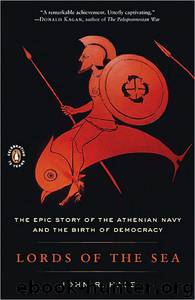Lords of the Sea: The Epic Story of the Athenian Navy and the Birth of Democracy by John R. Hale

Author:John R. Hale [Hale, John R.]
Language: eng
Format: mobi, epub
Tags: Europe, Ancient, Democracy - Greece - Athens - History - to 1500, Democracy, Greece, Athens, General, Athens (Greece), Political Ideologies, To 1500, Political Science, Athens (Greece) - History, Military, History, Naval
ISBN: 9780143117681
Google: Dmb4KI5CwJYC
Amazon: B00256Z2JG
Publisher: Penguin
Published: 2009-05-14T00:00:00+00:00
THE SICILIAN EXPEDITION, 415-413 B.C.
He went peacefully, leaving Nicias and Lamachus in charge of the expedition. At one of the landing places on the Italian coast, however, Alcibiades eluded the crew of the Salaminia and disappeared. Convinced now of his guilt, the Athenians at home condemned their scandalous general to death. When word of the sentence reached him, Alcibiades said only, “I shall show them that I am still alive.” He soon sought refuge in Sparta, one of the few safe places for an Athenian outlaw, and offered the Spartans advice on how they might defeat his native city.
With Alcibiades no longer sharing command of the fleet in Sicily, Lamachus was able to bring Nicias briefly to life. Luring the Syracusan army overland to Catana by means of a false report, Nicias and Lamachus loaded their own troops onto the triremes and raced down the coast to the Great Harbor, where they landed unopposed. Before the Syracusans discovered the ruse and returned, Athenian carpenters and shipwrights had chopped down trees and built a stockade to protect the triremes. The next day, amid crashing thunder, lightning, and rain, the Athenians defeated the Syracusan army in a battle near the city walls. But the appearance of the enemy cavalry prevented the Athenian hoplites from gaining a decisive victory. They had no choice but to return to Catana. More optimistic now, Nicias and Lamachus sent a letter to the Assembly with a report on the expedition’s first campaigning season and an appeal for more horsemen and money.
The workmen in the camp at Catana spent the winter making bricks and implements of iron. The Athenians were preparing to surround Syracuse with a siege wall on land and a blockade of ships at sea. Meanwhile Nicias entered into secret communication with pro-Athenian Syracusans who seemed ready to open the gates, once they convinced the other citizens that resistance was futile. With more battles like the one just fought in the Great Harbor, and more help from Syracusan turncoats, the generals hoped for a speedy end to their mission.
One year later the quick victory had failed to materialize. Nicias sent a second annual report from a new camp on land that the Athenians had seized within the Great Harbor itself. Far from being over, the war was dragging on with diminishing prospects for success. Nicias now commanded alone—Lamachus had died in the fighting when they brought the fleet to Syracuse and established a permanent base there. As would happen many times during the Sicilian expedition, an Athenian victory had lost more than it gained. The untimely death of the plain-speaking veteran extinguished the spark of Athenian initiative. Never known for forcefulness, Nicias’ energy was sapped further by a debilitating condition of the kidneys. To justify his poor performance, he described the troubles that confronted the Athenian force.
“Our fleet was originally in first-class condition; the timbers were sound and the crews were in good shape. Now, however, the ships have been at sea so long that the timbers have rotted, and the crews are not what they were.
Download
Lords of the Sea: The Epic Story of the Athenian Navy and the Birth of Democracy by John R. Hale.epub
This site does not store any files on its server. We only index and link to content provided by other sites. Please contact the content providers to delete copyright contents if any and email us, we'll remove relevant links or contents immediately.
The Secret History by Donna Tartt(16634)
The Social Justice Warrior Handbook by Lisa De Pasquale(11490)
Thirteen Reasons Why by Jay Asher(7792)
This Is How You Lose Her by Junot Diaz(5777)
Weapons of Math Destruction by Cathy O'Neil(5039)
Zero to One by Peter Thiel(4827)
The Myth of the Strong Leader by Archie Brown(4790)
Promise Me, Dad by Joe Biden(4451)
Beartown by Fredrik Backman(4421)
Stone's Rules by Roger Stone(4418)
How Democracies Die by Steven Levitsky & Daniel Ziblatt(4400)
The Fire Next Time by James Baldwin(4345)
100 Deadly Skills by Clint Emerson(4080)
A Higher Loyalty: Truth, Lies, and Leadership by James Comey(4034)
Rise and Kill First by Ronen Bergman(4013)
The David Icke Guide to the Global Conspiracy (and how to end it) by David Icke(3884)
The Farm by Tom Rob Smith(3873)
Secrecy World by Jake Bernstein(3784)
The Doomsday Machine by Daniel Ellsberg(3733)
